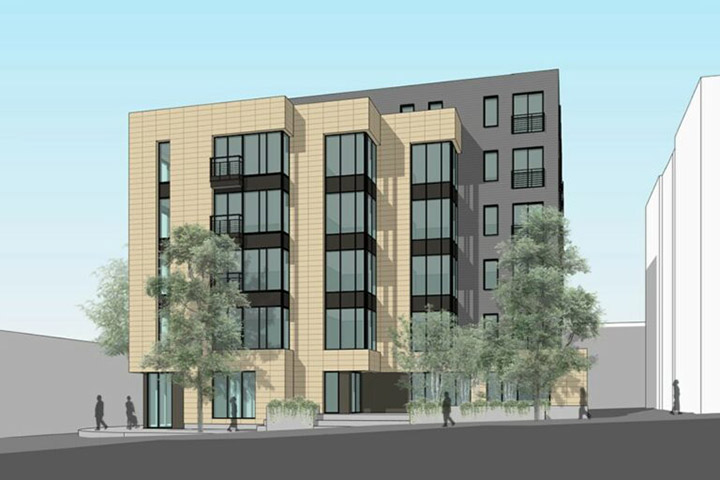Calls for Mayor Wu and city council to urgently address holdover board positions, codify new by-right housing in walkable, transit rich sections of the city.
 The proposed design for an affordable and sustainable housing/commercial development at 4198 Washington Street, Roslindale.
The proposed design for an affordable and sustainable housing/commercial development at 4198 Washington Street, Roslindale.Abundant Housing MA (AHMA) stands with our members from WalkUP Roslindale, with other neighbors in Roslindale, and across the City of Boston in denouncing Tuesday’s decision by the Boston Zoning Board of Appeals (ZBA) to reject the zoning relief application for the proposed development at 4198 Washington Street in Roslindale Square.
AHMA believes that Massachusetts is for everyone. We work to ensure that every community in Massachusetts is open and welcoming to all households regardless of race, income, age, ability or any other life circumstance. We envision a housing market in Massachusetts that lets people move where they want, when they want, not when they have to. To achieve an equitable, affordable and environmentally sustainable Massachusetts and Boston we must build more homes of all types, shapes, and sizes near jobs, services, transportation and other existing infrastructure.
The proposed development at 4198 Washington Street would help Boston achieve this vision. By locating in the transit-rich Roslindale Square neighborhood and not building on-site parking, the developers would have been able to achieve the following community benefits:
- 42% of the 31 total homes built in this development would be affordable to low- and moderate-income households, far exceeding the 13% requirement under Boston’s Inclusionary Development Program (IDP);
- A brand new, larger space for Rozzie Square Theater, the only woman of color-owned improv theater in Boston;
- Right-to-return and below market rate rents for existing commercial tenants like Delicious Yogurt; and,
- Leveraging the site’s location in a highly transit-oriented neighborhood with commuter rail and multiple high-frequency bus routes and a pledge by the developer to subsidize CharlieCards for the future residents.
As a result of the misguided ZBA decision to deny the project with prejudice, the developer cannot bring this project back to the ZBA for at least one year. If they choose to re-apply, they will be required to include parking which will likely mean the elimination of a number of affordable homes and the below market rate commercial rents. It will also result in more traffic congestion on local streets around Roslindale Square.
Rather than being denied by the ZBA, the 4198 Washington Street proposal should be a precedent for the type of inclusive, affordable, and sustainable housing and commercial development that we need across the City of Boston. This is why many Roslindale residents spoke up to support this project during the community process, and why elected officials including District 5 City Councilor Ricard Arroyo, Former Mayor Kim Janey, and At Large City Councilor Julia Mejia all supported this proposal.
It is symbolic that this denial came from the ZBA almost to the hour that Mayor Wu took the oath of office. AHMA agrees with Mayor Wu who in the past has raised concern about the frequent need for zoning variances to approve new development in Boston and the arbitrary and capricious standards for granting them. The ZBA denial of variances for the 4198 Washington Street development is the latest in a string of incidents where Boston’s inability to enact zoning that serves the needs of our growing city resulted in actions that run counter to our community’s interests and values. Boston needs new zoning laws; in their absence, it needs fair and transparent standards for the granting of variances, reflecting the community planning and review work done by the BPDA.
AHMA calls upon Mayor Wu and the City Council to:
- Urgently work to fill the 11 ZBA vacancies with experts & community members who reflect the diversity of lifestyles in Boston and who prioritize abundant and affordable homes in all neighborhoods.
- Codify zoning rules that make approvals by-right for infill development without costly parking mandates that reduce affordability and sustainability in existing dense, transit rich neighborhoods, especially for projects with a substantial affordable component.

